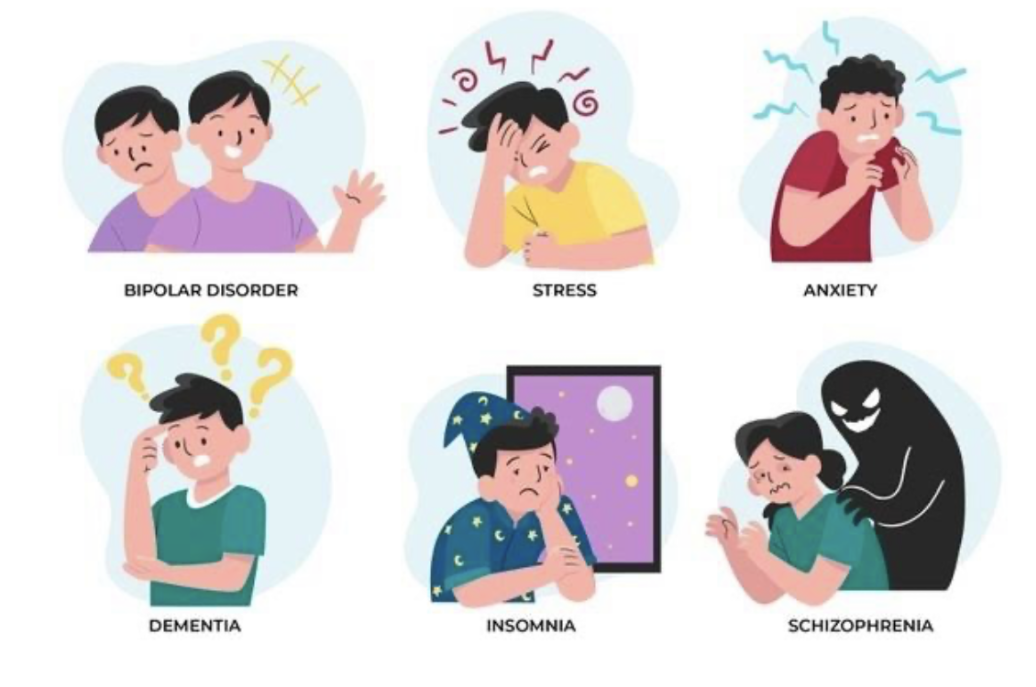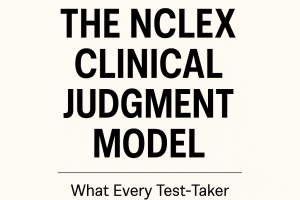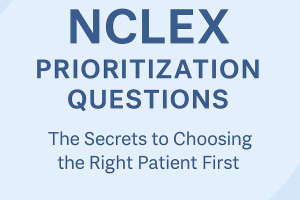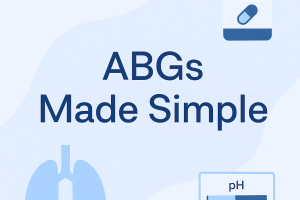TOP MENTAL HEALTH DISORDERS COVERED ON THE NCLEX

Introduction
Mental health disorders are a vital part of the NCLEX, and for good reason—nurses play a critical role in providing care for patients experiencing psychological challenges. From anxiety and depression to schizophrenia and bipolar disorder, the NCLEX tests your knowledge of common psychiatric conditions, therapeutic communication, and prioritization of care.
In this guide, we’ll explore the top mental health disorders you’re likely to encounter on the NCLEX, break down their key features, and discuss essential nursing interventions. By understanding these disorders, you’ll not only excel on the NCLEX but also be better equipped to provide compassionate and effective care in clinical practice.
1. Anxiety Disorders
Anxiety disorders are among the most commonly tested conditions on the NCLEX. These include generalized anxiety disorder (GAD), panic disorder, and phobias.
Key Symptoms:
• Persistent worry or fear
• Physical manifestations: rapid heartbeat, sweating, restlessness
• Panic attacks characterized by chest pain, shortness of breath, and dizziness
Nursing Interventions:
• Use therapeutic communication to encourage expression of feelings.
• Teach relaxation techniques like deep breathing and mindfulness.
• Administer medications such as benzodiazepines or SSRIs as prescribed.
2. Depression
Depression is a major mental health concern tested on the NCLEX, emphasizing nursing care for patients with mood disorders.
Key Symptoms:
• Persistent sadness or loss of interest
• Changes in appetite or sleep patterns
• Feelings of worthlessness or suicidal ideation
Nursing Interventions:
• Conduct suicide risk assessments.
• Encourage participation in daily activities and social interactions.
• Educate patients on medication adherence and potential side effects of antidepressants like SSRIs.
3. Bipolar Disorder
Bipolar disorder involves alternating episodes of mania and depression.
Key Symptoms:
• Mania: elevated mood, impulsivity, decreased need for sleep
• Depression: low energy, feelings of hopelessness
Nursing Interventions:
• Set clear boundaries and limits during manic episodes.
• Monitor for medication side effects, especially lithium toxicity.
• Educate patients about the importance of mood-stabilizing medications.
4. Schizophrenia
Schizophrenia is a severe mental illness characterized by disturbances in thought and perception.
Key Symptoms:
• Positive symptoms: hallucinations, delusions, disorganized speech
• Negative symptoms: apathy, lack of motivation, social withdrawal
Nursing Interventions:
• Establish trust and build a therapeutic relationship.
• Promote medication adherence, especially antipsychotics like risperidone.
• Use clear, simple communication to address delusions or hallucinations.
5. Post-Traumatic Stress Disorder (PTSD)
PTSD develops after exposure to a traumatic event and is a key focus in mental health nursing.
Key Symptoms:
• Flashbacks and nightmares
• Avoidance of trauma-related stimuli
• Hypervigilance and exaggerated startle response
Nursing Interventions:
• Provide a safe environment to reduce triggers.
• Encourage the use of grounding techniques during flashbacks.
• Refer patients to psychotherapy or trauma-informed care specialists.
6. Substance Use Disorders
Substance use disorders often co-occur with other mental health conditions and are commonly tested on the NCLEX.
Key Symptoms:
• Impaired control over substance use
• Withdrawal symptoms when not using the substance
• Negative impact on personal and professional life
Nursing Interventions:
• Assess for withdrawal symptoms and provide appropriate management (e.g., benzodiazepines for alcohol withdrawal).
• Educate patients about available resources, such as support groups.
• Promote relapse prevention strategies, including coping mechanisms.
NCLEX Practice Questions
1. A patient diagnosed with schizophrenia states, “I hear voices telling me to harm myself.” What is the priority nursing intervention?
• A. Encourage the patient to ignore the voices.
• B. Ensure the patient’s safety and report the statement immediately.
• C. Distract the patient with engaging activities.
• D. Administer PRN antipsychotic medication.
Answer: B. Ensuring safety is the priority, as the patient is at risk for self-harm.
2. A nurse is caring for a patient with severe depression. Which intervention is most effective in promoting therapeutic communication?
• A. Offering frequent advice to solve problems.
• B. Asking open-ended questions to encourage expression of feelings.
• C. Avoiding the topic of feelings to prevent distress.
• D. Providing minimal interaction to respect the patient’s privacy.
Answer: B. Open-ended questions help the patient express emotions and build trust.
3. A patient with PTSD reports having flashbacks triggered by loud noises. What is the best nursing intervention?
• A. Encourage the patient to relive the traumatic experience.
• B. Provide the patient with grounding techniques to manage flashbacks.
• C. Administer sedatives to prevent flashbacks.
• D. Recommend avoiding all noise to eliminate triggers.
Answer: B. Grounding techniques help the patient stay connected to the present moment.
4. A patient with bipolar disorder is experiencing mania. What is the most appropriate nursing intervention?
• A. Allow the patient to freely express themselves.
• B. Engage the patient in group activities to socialize.
• C. Provide a low-stimulation environment and set clear boundaries.
• D. Discourage all physical activity to prevent exhaustion.
Answer: C. A calm, structured environment helps manage manic symptoms.
5. A nurse is administering lithium to a patient with bipolar disorder. What finding requires immediate intervention?
• A. The patient reports mild hand tremors.
• B. The patient has a serum lithium level of 2.0 mEq/L.
• C. The patient complains of dry mouth.
• D. The patient has a slight increase in thirst.
Answer: B. A serum lithium level of 2.0 mEq/L indicates toxicity, requiring immediate intervention.
Conclusion
Mental health disorders are a significant focus on the NCLEX and in clinical practice. By understanding the key features of these conditions and implementing effective nursing interventions, you can provide compassionate, evidence-based care. Use this guide as part of your NCLEX prep to build confidence and achieve success.






